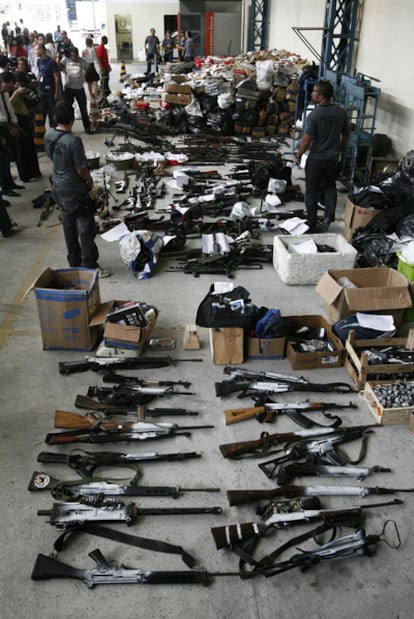Major operation brings Brazil favela back under control
Thousands of troops and officers wrest major Rio slum from narcs
Around 2,600 police officers and military troops took charge this weekend of the main areas in the Complexo do Alemão slum, in Rio de Janeiro. They did not encounter the kind of armed resistance they had been expecting from the drug gangs, who were controlling the area.
The operation began on Sunday around 8am local time, after the deadline given to the hundreds of drug traffickers there to turn themselves in had expired.
"We won. We have brought freedom to the people of Alemão," said Colonel Mario Sergio Duarte, commander of Rio's military police. In the space of just 90 minutes, members of the military, civil and federal police, together with army units, occupied strategic locations in the complex network of favelas that blanket a hill to the north of the city. Helicopters and tanks were used in the siege, which began on Friday. Dozens of traffickers "preferred to flee" rather than face the law, according to Duarte. The former, however, may be planning some kind of counterattack.
The drug traffickers may be planning some kind of counter attack
"We have regained our democratic status," said the state governor
"All we've done is take the territory," he said. The task ahead is now to conduct a "house by house search" through a slum area that is home to around 400,000 people. This part of the operation, Duarte said, will require "patience and great care."
Politicians were exultant over the success of the operation. The governor of the state of Rio, Sérgio Cabral of the centrist PMDB party, said that "Rio has finally regained its democratic status" because the territory has been wrested from the hands of the narcs in a city "which for the last 30 years had been suffering great social and economic decadence and a lack of public safety."
Visibly moved by the events, Cabral said that "we are turning a page in the history of a Brazil that was in anguish over its lack of security." The governor was thinking not just about Rio but also other cities such as Salvador de Bahía, Sâo Paulo, Recife and Vitoria, which are also beholden to the power of drug rings in a country that does not produce the drugs, but which distributes them to the world.
The operation to repossess an area of Rio with the greatest concentration of traffickers in the entire country (1,200, according to the news outlet Veja) is meant to show citizens who has the power in the cities - whether it is the drug cartels or the state. Rio, and in part Brazil, is sadly accustomed to seeing cities under the control of traffickers who impose their laws in connivance with corrupt police officials, the lawyers of dangerous criminals, and judges and politicians who use narcs to preserve their parcel of power and get rich quick.
So far, authorities have arrested more than a dozen people and seized weapons and stashes of marijuana and cocaine, according to police sources, who have not disclosed information about the number of dead or injured in an operation that seeks to end the wave of violence initiated a week ago by the drugs rings of Comando Vermelho, who challenged the authorities by burning around 100 vehicles in several areas of Rio. Thirty-five people died in that operation.
Military officials have asked inhabitants of the favelas, where more operations are planned, to cooperate with the house searches. The police know that many narcs use weapons to force people to conceal them. For the first time ever, favela dwellers sent hundreds of anonymous messages to the authorities informing them of possible hideouts. Some people said that they did so because they are hopeful that the slums will finally be freed of "the bandits."

Tu suscripción se está usando en otro dispositivo
¿Quieres añadir otro usuario a tu suscripción?
Si continúas leyendo en este dispositivo, no se podrá leer en el otro.
FlechaTu suscripción se está usando en otro dispositivo y solo puedes acceder a EL PAÍS desde un dispositivo a la vez.
Si quieres compartir tu cuenta, cambia tu suscripción a la modalidad Premium, así podrás añadir otro usuario. Cada uno accederá con su propia cuenta de email, lo que os permitirá personalizar vuestra experiencia en EL PAÍS.
¿Tienes una suscripción de empresa? Accede aquí para contratar más cuentas.
En el caso de no saber quién está usando tu cuenta, te recomendamos cambiar tu contraseña aquí.
Si decides continuar compartiendo tu cuenta, este mensaje se mostrará en tu dispositivo y en el de la otra persona que está usando tu cuenta de forma indefinida, afectando a tu experiencia de lectura. Puedes consultar aquí los términos y condiciones de la suscripción digital.








































